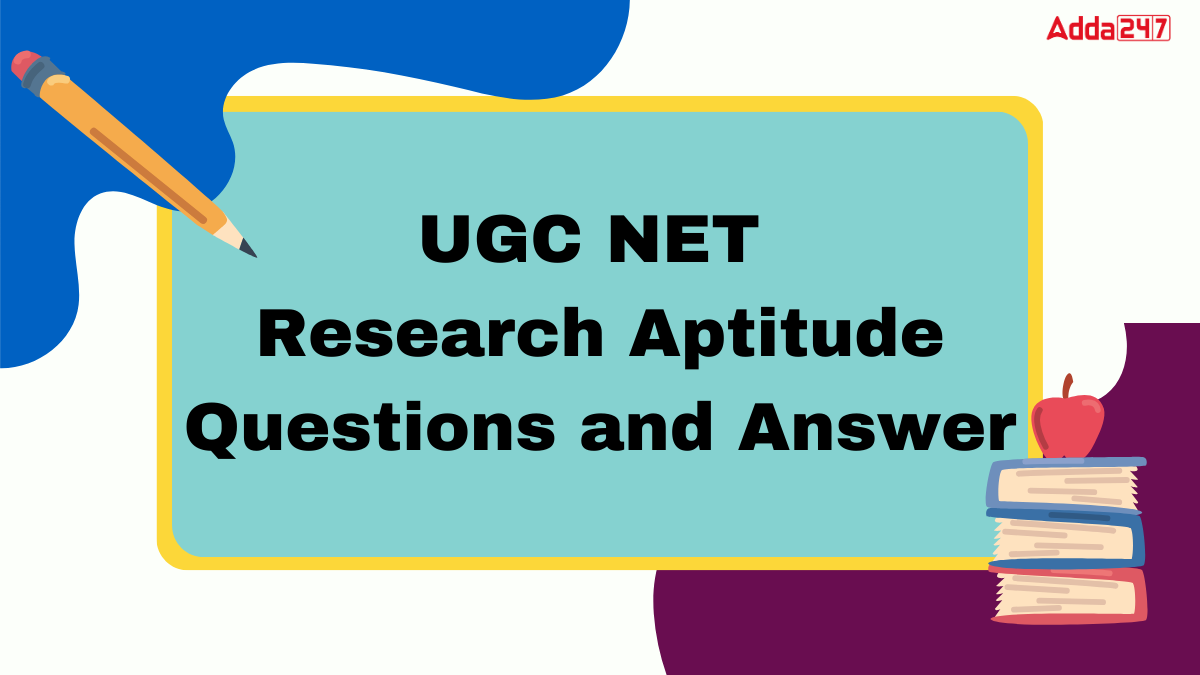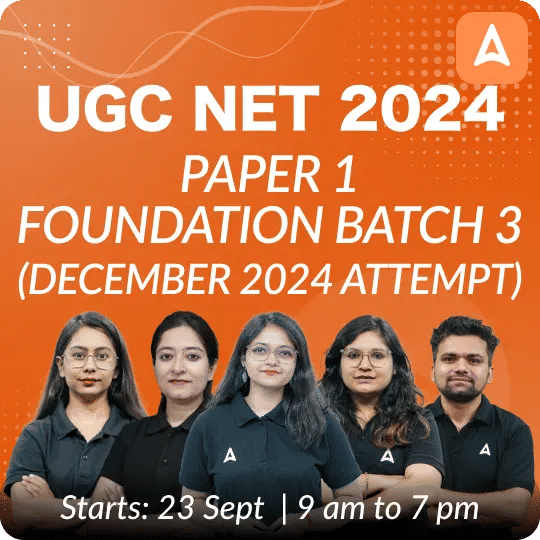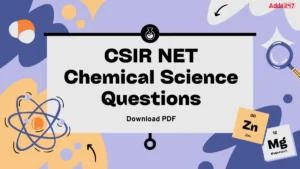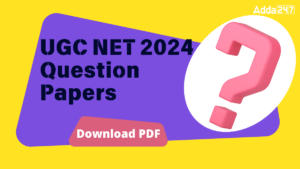Table of Contents
The University Grants Commission National Eligibility Test (UGC NET) is an essential examination for those aiming to become Assistant Professors, secure a Junior Research Fellowship (JRF), or pursue a PhD at Indian universities and colleges.
The Research Aptitude section of the UGC NET is crucial, evaluating candidates’ understanding of research methodologies, data analysis, and logical reasoning. A robust preparation strategy for this section can significantly boost your overall exam performance. To support your preparation, we offer the UGC NET Research Aptitude Questions with Answers PDF below.
UGC NET Research Aptitude
The Research Aptitude section of the UGC NET Paper 1 evaluates a candidate’s comprehension of research principles and their application in practical scenarios. This section emphasizes various aspects of research, including understanding research methodologies, data interpretation, and logical reasoning.
To excel in this section, candidates must focus on critical topics and engage in consistent practice with sample questions. A well-structured preparation strategy is vital to mastering the Research Aptitude section and securing high marks in the UGC NET examination.
- Research
- Methods of Research
- Steps of Research
- Thesis and Writing
- Application of ICT in Research
- Research Ethics
Tips for Preparing for the NET Research Aptitude Section
Successfully preparing for the NET Research Aptitude Section, with the aid of UGC NET Research Aptitude Questions with Answers, requires a strategic approach and dedicated effort. By focusing on key concepts, practicing regularly, and utilizing quality study materials, candidates can significantly enhance their understanding and boost their overall exam performance. Here are some valuable tips to guide your preparation.
- Understand the Syllabus Thoroughly: Familiarize yourself with the topics covered under the Research Aptitude section, such as types of research, methods, ethics, sampling, and hypothesis testing. Break down the syllabus into smaller, manageable sections for systematic study.
- Focus on Research Fundamentals: Build a strong foundation in research concepts, including the research process, characteristics, and objectives. Understand key terms like variables, validity, reliability, and sampling techniques.
- Refer to Standard Study Material: Use reliable sources like UGC NET Paper 1 preparation books, research methodology textbooks, and study materials specific to the syllabus. Make notes while studying for easy revision.
- Practice with Previous Years’ Papers: Solve past UGC NET question papers to understand the pattern of questions. Analyze the difficulty level and focus on recurring topics to identify key areas of importance.
- Attempt Mock Tests Regularly: Take online mock tests or practice tests specifically designed for UGC NET Paper 1. This will improve your time management and problem-solving speed, crucial for exam success.
- Enhance Logical Reasoning and Analysis Skills: Research Aptitude is not just about theory; it also assesses your ability to analyze and interpret data. Practice solving questions involving data analysis, research interpretations, and case-based problems.
- Develop a Strategy for Answering Questions: Learn to identify keywords in questions, eliminate incorrect options, and focus on logical reasoning. Allocate specific time for each question while practicing to optimize exam performance.
- Focus on Research Ethics: Research ethics is a critical part of the syllabus. Understand concepts like plagiarism, ethical issues in research, and intellectual property rights to tackle these questions effectively.
- Use Visual Aids and Mnemonics: Create charts, diagrams, or mnemonics to remember key concepts like types of sampling, steps in research, and differences between qualitative and quantitative research.
- Consistent Revision: Regularly revise the topics you have studied to retain the information effectively. Highlight important points for a quick recap before the exam.
Download PDF of UGC NET Research Aptitude Questions with Answers
For a comprehensive collection of UUGC NET Research Aptitude Questions with Answers, candidates can download a specially curated PDF. This resource includes a wide range of questions covering various aspects of research methodology, data analysis, and logical reasoning, all tailored to the UGC NET syllabus.
| UGC NET Research Aptitude Questions Download PDF | |
| UGC NET Research Aptitude Questions – Part 1 | Download PDF |
| UGC NET Research Aptitude Questions – Part 2 | Download PDF |
UGC NET Research Aptitude MCQ Questions
Q1. Which of the following forms the foundation for Survey Research?
(a) Constructivism
(b) Humanistic
(c) Interpretivism
(d) Positivism
Q2. Which of the following approaches is frequently employed in anthropological studies?
(a) Case study method
(b) Ethnographic method
(c) Both (a) & (b)
(d) None of the above
Q3. Given below are two statements:
Statement I: Parametric statistics are more powerful than non-parametric statistics.
Statement II: Parametric statistics are assumption free statistics
(a) Both statement I and statement II are false
(b) Both Statement I and statement II are true
(c) Statement I is false but statement II is true
(d) Statement I is true but statement II is false
Q4. If a researcher needs to assess whether there is a significant difference between the means of two groups to test a hypothesis, which statistical method would they employ?
(a) Chi-square test
(b) Correlation coefficient
(c) Sign-test
(d) Student’s t-test
Q5. Which of the below mentioned approaches falls under the quantitative approach?
A. Simulation approach
B. projective technique
C. Inferential approach
D. Depth interview
E. Experimental approach
(a) A, B and C only
(b) A, C and E only
(c) B, C and D only
(d) B, C and E only
Q6. A condition or characteristic that can take on different values or categories is called
(a) A constant
(b) A variable
(c) A cause-and-effect relationship
(d) A descriptive relationship
Q7. Here, some people have greater chance of being elected than other members of the populations. It is
(a) Probability sampling
(b) Non-probability sampling
(c) Quota sampling
(d)None of the above
Q8. In a research study to learn the impact of the Internet surfing on exam performance, it was found that as the number of hours spent on the Internet surfing increases, the exam performance deteriorates. This study is an example of
(a) Experimental method
(b) Correlational research
(c) Case study
(d) None of the above
Q9. Data of research take the forms of words or pictures with the researchers as the key instrument in which of the following studies?
(a) Participants observation-based studies
(b) Ex post facto studies
(c) Experimental studies
(d) Descriptive survey studies
Q10. The essential characteristic of a researchable question is.
(a) Question seems interesting to answer.
(b) Possibility of data collection that can be collected in an attempt to answer a question.
(c) Possibility of commercialization.
(d) A significant positive change in society.
Solutions
S1. Ans.(d)
S2. Ans.(b)
S3. Ans.(d)
S4. Ans.(d)
S5. Ans.(b)
S6. Ans.(b)
S7. Ans.(b)
S8. Ans.(b)
S9. Ans.(a)
S10. Ans.(b)




 CSIR NET Chemical Science Questions with...
CSIR NET Chemical Science Questions with...
 UGC NET 2024-25 Question Papers 1 and 2,...
UGC NET 2024-25 Question Papers 1 and 2,...
 CSIR NET General Aptitude Questions Answ...
CSIR NET General Aptitude Questions Answ...














